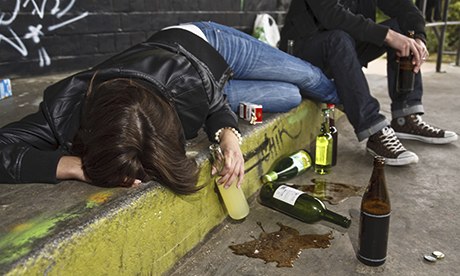Science now allows us to develop a safer way to get drunk. But before we can sober up in minutes, the drinks industry needs to embrace this healthier approach

'If alcohol was discovered today it could never be sold as it is far too toxic to be allowed under current food regulations'. Photograph: Action Press/Rex Features
Imagine enjoying a seasonal drink at a Christmas party without the risk of a hangover the next day, or being able then to take an antidote that would allow you to drive home safely. It sounds like science fiction but these ambitions are well within the grasp of modern neuroscience.
Alcohol is both one of the oldest and most dangerous drugs, responsible for about 2.5 million deaths worldwide, which is more than malaria or Aids. The reasons for this are well known: alcohol is toxic to all body systems, and particularly the liver, heart and brain. It makes users uninhibited, leading to a vast amount of violence and is also quite likely to cause dependence, so about 10% of users get locked into addiction. If alcohol was discovered today it could never be sold as it is far too toxic to be allowed under current food regulations, let alone pharmaceutical safety thresholds. In this health-conscious age, it is odd that these aspects of alcohol are rarely discussed.
The only proven way to reduce alcohol harms is to limit consumption through increased pricing and limiting availability. Most governments have shied away from this because of pubic opinion and fears of lost tax income – the notable exception being Scotland with its minimum pricing strategy. An alternative strategy that offers greater health benefits would be to make a safer version of alcohol.
We know that the main target for alcohol in the brain is the neurotransmitter system gamma aminobutyric acid (Gaba), which keeps the brain calm. Alcohol therefore relaxes users through mimicking and increasing the Gaba function. But we also know that there are a range of Gaba subsystems that can be targeted by selective drugs. So in theory we can make an alcohol surrogate that makes people feel relaxed and sociable and remove the unwanted effects, such as aggression and addictiveness.
I have identified five such compounds and now need to test them to see if people find the effects as pleasurable as alcohol. The challenge is to prepare the new drink in a fashion that makes it as tasty and appealing. This is likely to be in the form of a cocktail, so I foresee plenty of different flavours. The other great advantage of this scientific approach to intoxication is that if we target compounds that affect the Gaba system, then it is possible to produce other drugs that could be sold alongside the alcohol substitute as an antidote.
I have sampled both new forms. After exploring one possible compound I was quite relaxed and sleepily inebriated for an hour or so, then within minutes of taking the antidote I was up giving a lecture with no impairment whatsoever.
All that is needed now is funding to test and put them on the market. A few contacts within the alcohol industry suggest they are interested but do not need to engage until this new invention becomes a threat to their sales. This is a similar situation to that of the tobacco companies when e-cigarettes were being developed. They stood back at first but now own many of the companies making the safer alternatives to cigarettes. Likewise, without investing in a new approach to alcohol, we shall not realise the enormous health potential of a safer alternative.
